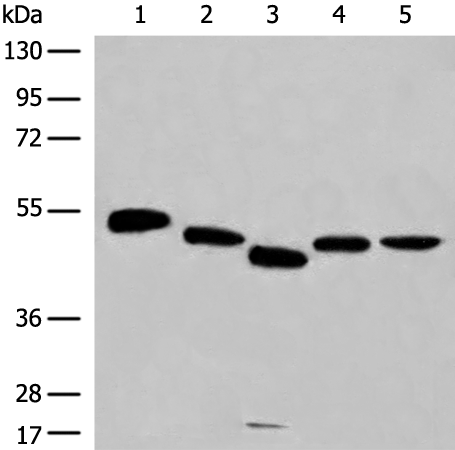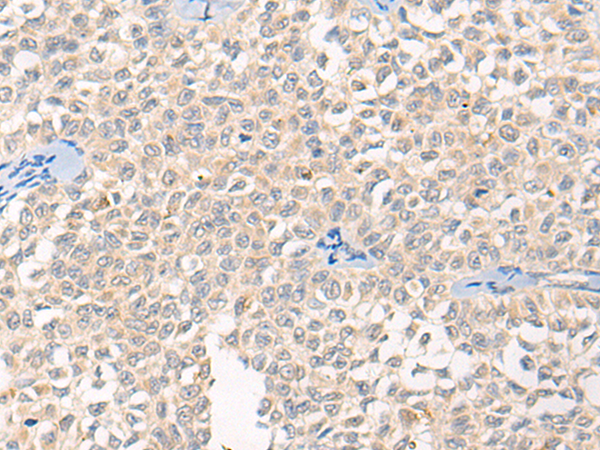

| WB | 咨询技术 | Human,Mouse,Rat |
| IF | 咨询技术 | Human,Mouse,Rat |
| IHC | 1/20-1/100 | Human,Mouse,Rat |
| ICC | 技术咨询 | Human,Mouse,Rat |
| FCM | 咨询技术 | Human,Mouse,Rat |
| Elisa | 1/5000-1/10000 | Human,Mouse,Rat |
| WB Predicted band size | 56 kDa |
| Host/Isotype | Rabbit IgG |
| Antibody Type | Primary antibody |
| Storage | Store at 4°C short term. Aliquot and store at -20°C long term. Avoid freeze/thaw cycles. |
| Species Reactivity | Human, Mouse |
| Immunogen | Fusion protein of human RCOR3 |
| Formulation | Purified antibody in PBS with 0.05% sodium azide and 50% glycerol. |
+ +
以下是关于RCOR3抗体的3篇参考文献概览(简略版):
---
1. **文献名称**:*RCOR3 is a novel prognostic biomarker and promotes oncogenesis in hepatocellular carcinoma*
**作者**:Li Y, et al.
**摘要**:研究通过免疫组化(使用RCOR3抗体)发现RCOR3在肝癌组织中高表达,与患者预后不良相关。机制研究表明RCOR3通过调控Wnt/β-catenin通路促进肿瘤增殖和转移。
---
2. **文献名称**:*The role of RCOR3 in maintaining pluripotency of human embryonic stem cells*
**作者**:Zhang H, et al.
**摘要**:利用RCOR3抗体进行染色质免疫沉淀(ChIP)分析,证明RCOR3与SOX2、OCT4协同作用,维持胚胎干细胞多能性,敲低RCOR3导致分化相关基因异常激活。
---
3. **文献名称**:*RCOR3 interacts with LSD1 to suppress epithelial-mesenchymal transition in breast cancer*
**作者**:Wang Q, et al.
**摘要**:通过Western blot和免疫荧光(使用RCOR3特异性抗体)发现,RCOR3与去甲基化酶LSD1结合,抑制乳腺癌上皮间质转化(EMT),其表达降低与肿瘤转移呈正相关。
---
**备注**:若需具体实验抗体信息(如品牌、货号),需进一步查阅文献材料与方法部分。
The RCOR3 antibody is a tool used to detect the REST Corepressor 3 (RCOR3) protein, a member of the RCOR family (RCOR1. RCOR2. RCOR3) that interacts with the repressor element-1 silencing transcription factor (REST). RCOR3 functions as a transcriptional co-repressor, primarily by forming complexes with REST and chromatin-modifying enzymes, such as histone demethylases (e.g., LSD1/KDM1A) and histone deacetylases (HDACs). This interaction facilitates chromatin remodeling, leading to gene silencing, particularly in neural and developmental contexts. RCOR3 is implicated in regulating neuronal gene expression, stem cell differentiation, and cellular responses to stress.
Unlike RCOR1 and RCOR2. RCOR3 exhibits tissue-specific expression, with higher levels observed in the brain, testis, and certain cancers. Its role in cancer remains debated, with studies suggesting both tumor-suppressive and oncogenic functions depending on cellular context. For example, RCOR3 may promote neuroblastoma progression by modulating REST-dependent gene networks, while its loss has been linked to genomic instability in other cancers.
RCOR3 antibodies are widely used in research to study protein localization (via immunohistochemistry or immunofluorescence), expression levels (via Western blot), and protein-DNA interactions (via ChIP-seq). Validation of these antibodies often involves knockout cell lines or tissues to confirm specificity. Commercially available RCOR3 antibodies vary in host species (rabbit, mouse), clonality (monoclonal/polyclonal), and applications, requiring careful selection based on experimental needs.
×